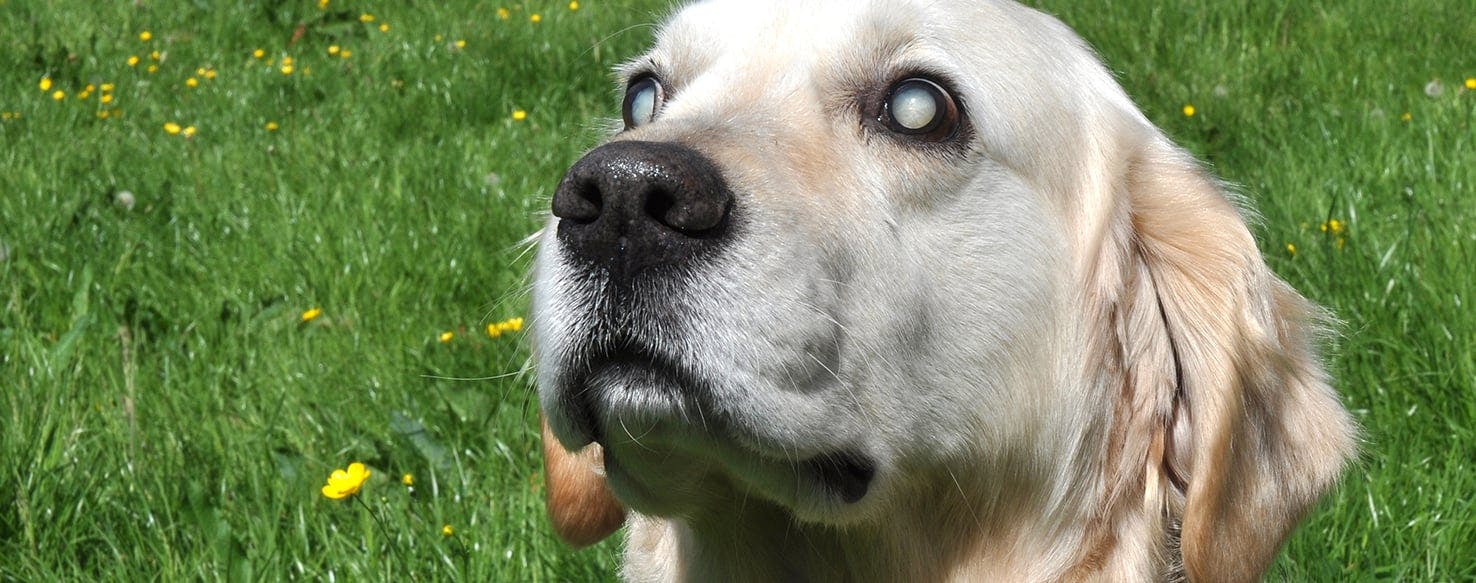Cloudy vision is a common problem in the over forty crowd. Most of this vision loss is caused by proteins clumping together inside of the eye's lens. These cloudy spots are called cataracts, and can make your sight go from 100 to 0 in the blink of an eye. Thankfully, most cataracts in humans are pretty treatable. But what about in dogs? Do senior canine citizens also develop cataracts? And what about younger pups, are they susceptible to cloudy lenses too?
Can Dogs Get Cataracts?
YES!
Dogs can indeed get cataracts! In fact, cataract development in pooches is almost exactly the same as it is in people. Some cataracts appear almost instantly, while others grow large over time. One thing to note is that many owners often mistake the natural aging of a dog's eye, called nuclear sclerosis, for cataracts. Dogs with cataracts often have obvious cloudy patches over their pupils, which look kind of greyish in color. Nuclear sclerosis, which also goes by “old eye”, can make the eye look a bit hazy, but with a blue tone.
Does My Dog Have Cataracts?
Learning about what causes cataracts and the common signs that go along with the disease can help you spot these patches before your pup goes blind!
Symptoms
A well-known sign of cataract development in any eye is the cloudy, grey/white appearance of the normally black pupil. If your dog has cataracts, it will likely have trouble seeing obstacles and may bump into things or bark at furniture.
Causes
Most cataracts are passed down genetically. These can arrive any time during your dog's life, but usually do not show up until year 6 of life, or even older! Dogs with diabetes have a high chance of developing cataracts, and it generally happens pretty quickly. Any trauma to the eye, such as a swipe from a kitty, can turn into cataracts down the road.
Diagnosis
Your vet will be able to tell if your dog has cataracts through an ophthalmological examination. If they suspect that your pup is also suffering from diabetes, a blood test will be needed.
How Do I Treat My Dog's Cataracts?
Cataracts can rob your beloved pooch of nearly all of their vision! Thankfully, in most cases of cataracts, sight can be almost completely restored.
Treatment
Once the lens of an eye has gone cloudy, it can't be cured. That being said, it can be removed, and often this is done with much success! As long as your pup is healthy enough to undergo the process, surgery is a great way to bring back vision to your four-legged friend.
Recovery
Appointments will be needed after the surgery has been performed to make sure your dog is healing right. A few months after the operation, your hound should be all healed up!
How are Cataracts Similar in Dogs and Humans?
People and their pets experience much of the same problems when it comes to cataracts. Notable symptoms that affect dogs and humans alike include:
-
Vision loss
-
Cloudy pupils
-
Clumsiness
How are Cataracts Different in Dogs and Humans?
Dogs respond to loss of sight a bit differently than people do. Other symptoms that are obvious in humans are hard to confirm in animals. Some differences are:
-
Light sensitivity - humans often note this as a first sign when a cataract forms
-
Barking at inanimate objects - dogs do this when they cannot see, people, not so much
-
Dogs walk with their nose to the ground when they are having trouble seeing
Case Study
Even if surgery is not an option, cataracts do not have to be a death sentence. One older beagle had started to get rather cloudy eyes. His owner took him to the vet, who confirmed that the old boy had cataracts. His condition and age made surgery a poor option. At first, his owner was worried about the diagnosis, but soon it was obvious that the pup’s lack of vision was not holding him back. He learned how to get around using his other senses, which is something dogs are actually really good at!


